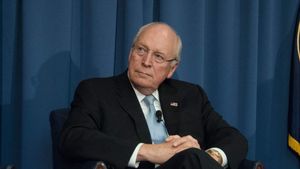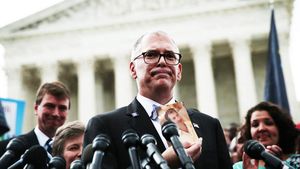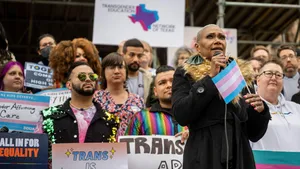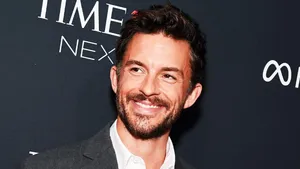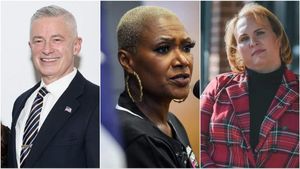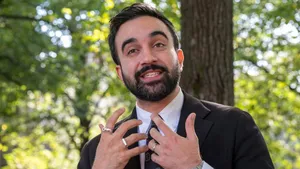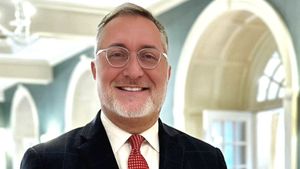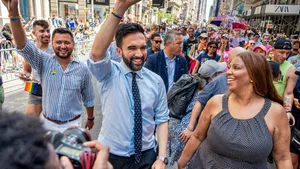Sia is one of the most successful pop stars in the world. The enigmatic bisexual singer and songwriter began her rise to the top in the early-2000s with an unprecedented leap of success in 2010, due to successful collaborations with David Guetta, Rihanna, and Flo Rida. Her seventh album This is Acting gave the Australian-born pop star her first Hot 100 number one single, “Cheap Thrills” (chances are you’re hearing it on a radio near you) and her performance at Coachella last year was hailed as “one of the greatest” by critics and fans, who turned it into a viral sensation.
For a younger generation, the camera-shy Sia — who is often seen only through a face-covering smattering of black and blond bangs — has become synonymous with mystery, which is seldom seen in today’s social media obsessed world. But perhaps Sia’s biggest mystery has to do with her manager, David Russell.
Just as it is for Sia, music has always been at the crux of Russell’s life. After graduating college in 1998 with a degree in musical theater, he immediately landed the tour of West Side Story. When it ended up being less than thrilling, Russell vowed never to do theater again. Instead, he found solace in the music industry, his “real passion.”
Russell worked as a publicist in New York City before transitioning into music management, where he’s been for the last 17 years. In his career, he’s worked with superstars like Jack Johnson, Robbie Williams, and Sia, the artist he’s 100 percent dedicated to right now. When he does something, he does it big — including coming out about his status, which he did publicly on Facebook in the summer of 2016.
Russell’s announcement was welcomed with admiration from music insiders and regular people alike, but few know the 14-year long journey it took to get there. He was 15 when he came out as gay to his family and friends — a rare thing to do in the early 1990s at the height of the AIDS crisis. His parents were incredibly supportive, which gave him, as he puts it, “the wherewithal and sense of self” to be bold and courageous in the face of adversity. That’s the same foundation he relied on to help him confront his HIV diagnosis at 26, and come out publically when he turned 40.
Growing up under the specter of AIDS, teenage Russell thought an HIV diagnosis was a death sentence. Like a lot of young gay and bisexual men, he spent much of his adult life concerned with contracting HIV. So, he took it upon himself to become well-versed in HIV prevention.

Snapshots through the years (from left): Russell with Cyndi Lauper; on vacation; with Sia and the Sesame Street crew;
That all changed in 2002. “I got what I thought was strep throat or the flu, and it got worse,” he recalls. “When I got back to [Los Angeles] it was so bad I didn’t know what to do, because I’d never been that sick. I really didn’t have any reason to believe it was HIV. I had to go to the hospital because I was dehydrated. They did a rapid HIV test and it was negative. They mentioned offhand they were going to do a viral load test, which was fairly new at that point.”
Russell left Cedars-Sinai, the largest nonprofit hospital in the western United States, thinking it was a bad strain of strep throat. That’s what his healthcare providers assumed. But on the day before Thanksgiving, he received a call.
“When he said it was [my doctor], I knew I had HIV,” Russell recalls. “I just knew instinctively. He said, ‘Are you somewhere you can talk?’ I said, ‘No I’m not, but are you going to tell me I’m HIV-positive?’ He said ‘I’m afraid I am.’ At that point everything seemed to go blank. I was completely in shock. It knocked me off my feet. I was on my knees basically. I didn’t understand how I could have contracted it and I didn’t understand how I was going to live a normal life. Not because I thought I was going to die, because at that point I knew it wasn’t a fatal illness, I knew there was treatment. I just didn’t know how I was going to find happiness and self-esteem.”
The journey to find personal value is a universal struggle, but it’s especially relevant when you’re first diagnosed. Like many gay 26-year olds, Russell derived a great deal of his self-esteem from his sexual expression. Becoming positive forced him to look at life in a different way.
“[Dating] was really hard at the beginning,” he reflects. “I didn’t know that many people when I moved to Los Angeles. I put a lot of self-worth in my own identity as a young gay man. I’d thought of myself as a very sexual being and I got a lot of self-esteem from having sex. When I was diagnosed with HIV, I sort of — in the moment — thought my sex life was over. Everything seemed to fall away because of that. If I wasn’t going to get my self-esteem from other men by making me feel sexy, how was I going to gain it? I don’t feel the same way now, of course. The world has changed and therefore my perspective has changed wildly, but in the winter of 2002, I was distraught. I didn’t know anyone else who was HIV-positive.… If I could [give advice to my younger self now] I’d tell him that your future is brighter and better, and more full of love and intimacy and acceptance and community than you could ever imagine.”
Russell started from “ground zero,” he says, in regards to reclaiming himself after the diagnosis. He hardly knew anyone in L.A. at the time, and the only person he knew had HIV in his whole life was a friend from high school who died of AIDS complications when Russell was 20. After a while, he felt a need to find community.
“I tried to integrate myself in some kind of HIV community. I really wanted to find a sense of community to figure out how I can go on with my life,” he says. “That’s important to have. There needs to be understanding that there is life, there is gratitude, love, intimacy, and it can meet your demands. You don’t need to sacrifice your self-esteem or your self-worth just because you’re HIV-positive. I wouldn’t have been able to gain that perspective had I not met other HIV-positive men who were going through that experience also.”
Social stigma, rejection Are harder to deflect. “It’s really hard and it happens on both ends by the way. A serodiscordant relationship can be difficult from a sexual perspective, or could be, I should say. PrEP has made a lot of those concerns and fears [obsolete]. When you’re with an undetectable partner, the likelihood of contracting HIV is nil, but those facts don’t often translate when you’re in a relationship, for whatever reason. I found myself many times to be in long-term relationships where my status and their status being serodiscordant created a variety of issues and problems. I’ve never shied away from my status, and I’ve never shied away from questions and intimacy around my status.”
One way to combat stigma, Russell says, is by knowing our history. He’s a fan of David France’s riveting book How to Survive a Plague. Highlighting the early battles against the AIDS epidemic, the book is based on France’s Oscar-nominated documentary film.
Russell says, as a 40-year old HIV-positive gay man, there is a responsibility to not only learn about the men who came before him, but to share the wisdom with younger generations.
“When I think stigma [around PrEP], I think about the hundreds of thousands of men that came before me who would have dreamed to have a pill that would protect their partners from contracting HIV, or protect themselves from contracting HIV from their partners,” he says. “I can’t believe we’ve reached this utopia in a certain way, and gay men aren’t willing to embrace it wholeheartedly.”
Russell thinks the country’s sexual bag-gage affects our sense of healthy sexuality, even today.
“Why shouldn’t people have as much sex as they want to have? Why shouldn’t responsible adults be able to connect with other responsible adults physically, without barriers if that’s possible? There has always been and will always be — as long as we live in a society dominated by a religious culture — a sense of shame and regret around gay sex. I think gay men perpetuate it as much as heterosexuals, if not more. We’ve been told for so long that the sex we have is bad, and the repercussions [are] bad, and we’re going to hell, and AIDS is a curse from God, etc. Well, if you grow up in a world where that is the permeating idea and you’re exposed to it every single day, it’s impossible to avoid taking that on. I think the shame around PrEP has to do with people being ashamed of gay sex.”

(From left): in activist garb; on-set with dancer Maddie Zeigler; and with Sia.
But will PrEP change all that? “We’re at the very beginning of our liberation, really,” he insists. “I was alive when homosexuality was [still] considered to be a psychological illness, so [our acceptance] is so new. Our history has never been told, and if it’s been told it’s been told under the shadow of a homophobic, religious, heterosexual background. We’ve never had our proper history told, we never had a proper sense of it. We’re just gaining that now. The two generations ahead of mine, and a good portion of my generation, were completely decimated by AIDS. They’re gone. They’re not here to tell the story.”
Russell argues that even though gay and bi men don’t have a sense of their collective histories, they inherited a great deal of baggage as both HIV and AIDS became synonymous with “gay” at a time when being gay — or having gay sex at least—was still against the law in many areas, even in the U.S.
“There was so much antigay rhetoric in the world. So you got this disease that’s killing people attached to a community that’s vilified and unaccepted the world over, and ACT UP, Peter Staley, and Larry Kramer, all these men that came before us, somehow managed in the face of total impossibility to [fight back]. I mean, I’m alive because of those men. There’s no question, I’m alive because of men like Peter Staley.”
In Russell’s own industry, he says homophobia has always been a struggle for artists, even today; but that didn’t stop people like Elton John, George Michael, or Boy George from dominating the music scene.
“Freddie Mercury couldn’t be out of the closet because of the time we were in, but he was everything except out of the closet,” he says. “You’d be hard-pressed to look at Boy George, or George Michael, or Freddie and look at their work, their connection to the audience, and say they were ‘lying.’ Even Boy George, in a cloak of drag-meets-punk aesthetic, was still putting himself as a human being out there. I think we’ve always had gay superstars, and we’ve had hetero superstars who bit gay superstars’ style and reaped the benefits of that. Do I think the world is ready for a gay superstar who’s exclusively gay, writing about men and putting men in their videos? I don’t know the answer to that. We haven’t seen it yet”
It’s clear we are living in a different age. When it comes to social media, the age of keeping secrets is virtually gone. “If you’re gay and carrying on in the closet, it’s going to be revealed,” Russell says. “There’s no secrecy in that sense anymore. You can’t orchestrate a heterosexual marriage like you could in the ’90s.”
It’s certainly no secret how Russell feels about the Trump presidency, either. Vice president Mike Pence is responsible for the worst HIV outbreak in Indiana’s history — because he refused to give funding to HIV prevention, and chose to support gay conversation therapy — but red state voters still rallied around him.
“Pence is a monster,” Russell says. “And that administration is monstrous on many levels. It’s horrifying. When you have an administration that doesn’t respect gays and lesbians, Black people, or any other minorities; you potentially have a life-threating fight for your life on your hands. It’s important to stay vigilant. Just like HIV itself, it’s important to realize how far we’ve come. I’m going to stay vigilant, but I’m not doing that at the expense of the truth. We’re living in a country where HIV meds are affordable. [HIV is] not a death sentence. It’s completely manageable. I think the same goes for our community. We may be facing down a monster, but we must not forget the truth: We are equally citizens and we must continue to fight against discrimination.”
This piece runs simultaneously in our current print issue, which you can download for free
here.






























